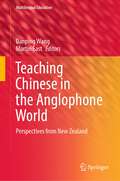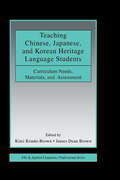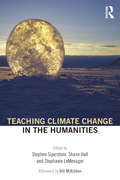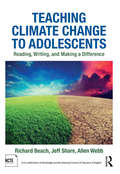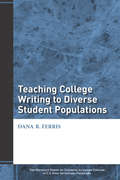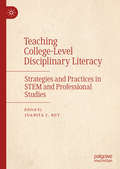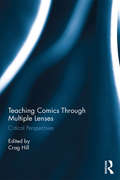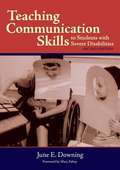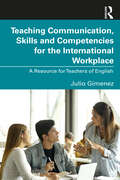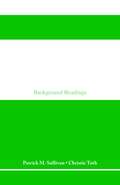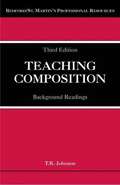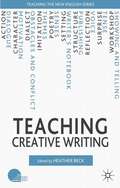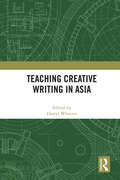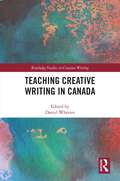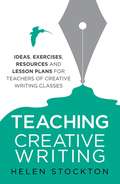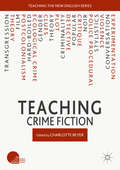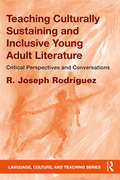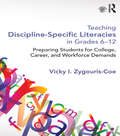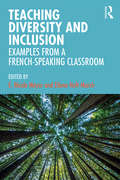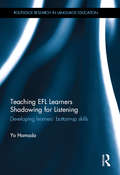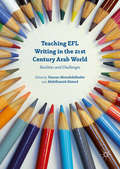- Table View
- List View
Teaching Chinese in the Anglophone World: Perspectives from New Zealand (Multilingual Education #44)
by Martin East Danping WangThis volume offers a comprehensive overview of Chinese language teaching in New Zealand, in light of the declining interest in foreign language learning in Anglophone countries. While existing scholarly works have discussed Chinese language education in other Anglophone countries, this book is the first to provide an in-depth examination of the landscape of Chinese language teaching in contemporary, multicultural New Zealand, featuring insights from leading experts. The book consists of 21 chapters written by 29 contributors, including research students, experienced teachers, and leading scholars in every educational sector, from preschool to university and from mainstream education to community schools.As the first volume to focus on this subject, the book provides both historical perspectives and multilevel analyses of critical milestones, based on the latest data, policy changes, and politico-economic conditions shaping the future direction of Chinese language education in New Zealand. Its purpose is to offer insights and an overview of the New Zealand case that can help policymakers, programme leaders, researchers, teachers, and learners in the Anglophone world and beyond, to better respond to the rapidly changing and challenging environments they face.In addition to the Foreword by Patricia Duff and the Epilogue, the book is a valuable resource for anyone interested in Chinese language education in New Zealand, and serves as a catalyst for further discussion and research on this topic.
Teaching Chinese, Japanese, and Korean Heritage Language Students: Curriculum Needs, Materials, and Assessment (ESL & Applied Linguistics Professional Series)
by James Dean Brown Kimmi Kondo-BrownThis book contributes to building the research knowledge that language teaching professionals need in developing curriculum for the large population of East Asian heritage students (including Chinese, Japanese, and Korean) in countries like the United States, Canada, and Australia, where speakers of East Asian languages are among the fastest growing populations. Heritage learners are defined as those who initially acquired certain levels of linguistic and cultural competence in a non-dominant language mainly through interaction with foreign-born parents and other family members at home. Heritage language instruction is currently a “hot topic” and is becoming a sub-discipline within the fields of foreign language education and applied linguistics. Special instruction for heritage language learners is on the rise, particularly in the U.S. and Canada. Providing theoretical and practical information about heritage-language instruction in terms of curriculum design, learner needs, materials development, and assessment procedures, the goal of this book is not only to promote research about heritage students in East Asian languages but also to improve the teaching of these students in various educational settings and all over the world, especially in English speaking countries. The volume is organized in four sections:*Overview—addressing the timeliness, necessity, and applications of the work and issues and future agendas for teaching Chinese, Japanese, and Korean heritage students;*Language Needs Analysis;*Attitude, Motivation, Identity, and Instructional Preference; and*Curriculum Design, Materials Development, and Assessment Procedures Teaching Chinese, Japanese, and Korean Heritage Language Students is intended as a primary text or reference for researchers, educators, and students in the areas of curriculum, pedagogy, and assessment studies related to teaching bilingual and heritage students in general and East Asian heritage students in particular.
Teaching Climate Change in the Humanities
by Stephen Siperstein, Shane Hall and Stephanie LeMenagerClimate change is an enormous and increasingly urgent issue. This important book highlights how humanities disciplines can mobilize the creative and critical power of students, teachers, and communities to confront climate change. The book is divided into four clear sections to help readers integrate climate change into the classes and topics they are already teaching as well as engage with interdisciplinary methods and techniques. Teaching Climate Change in the Humanities constitutes a map and toolkit for anyone who wishes to draw upon the strengths of literary and cultural studies to teach valuable lessons that engage with climate change.
Teaching Climate Change to Adolescents: Reading, Writing, and Making a Difference
by Richard Beach Allen Webb Jeff ShareCO-PUBLISHED BY ROUTLEDGE AND THE NATIONAL COUNCIL OF TEACHERS OF ENGLISH Teaching Climate Change to Adolescents is THE essential resource for middle and high school English language arts teachers to help their students understand and address the urgent issues and challenges facing life on Earth today. Classroom activities written and used by teachers show students posing questions, engaging in argumentative reading and writing and critical analysis, interpreting portrayals of climate change in literature and media, and adopting advocacy stances to promote change. The book illustrates climate change fitting into existing courses using already available materials and gives teachers tools and teaching ideas to support building this into their own classrooms. A variety of teacher and student voices makes for an appealing, fast-paced, and inspiring read. Visit the website for this book for additional information and links. All royalties from the sale of this book are donated to Alliance for Climate Education.
Teaching College Writing to Diverse Student Populations
by Ferris Dana R.Statistical and anecdotal evidence documents that even states with relatively little ethnic or cultural diversity are beginning to notice and ask questions about long-term resident immigrants in their classes. As shifts in student population become more widespread, there is an even greater need for second language specialists, composition specialists, program administrators, and developers in colleges and universities to understand and adapt to the needs of the changing student audience(s). This book is designed as an introduction to the topic of diverse second language student audiences in U. S. post-secondary education. It is appropriate for those interested in working with students in academic settings, especially those students who are transitioning from secondary to post-secondary education. It provides a coherent synthesis and summary not only of the scope and nature of the changes but of their practical implications for program administration, course design, and classroom instruction, particularly for writing courses. For pre-service teachers and those new(er) to the field of working with L2 student writers, it offers an accessible and focused look at the “audience” issues with many practical suggestions. For teacher-educators and administrators, it offers a resource that can inform their own decision-making.
Teaching College-Level Disciplinary Literacy: Strategies and Practices in STEM and Professional Studies
by Juanita C. ButThis volume foregrounds the disciplinary literacy approach to college teaching and learning with in-depth discussions of theory and research, as well as extensive classroom illustrations. Built upon the current work of READ (Reading Effectively Across the Disciplines), a disciplinary literacy program at New York City College of Technology, it presents a broad collection of methodologies, strategies, and best practices with discipline-specific considerations. It offers an overview of the program informed by evidence-based research and practices in college disciplinary learning, describing how its unique model addresses the literacy needs of students in STEM and professional studies. Chapter authors, including administrators, literacy specialists, and content experts discuss program design, professional development, and assessments. They also outline strategies to foster disciplinary literacy pedagogy and college success in five content areas, including Accounting, Architecture, Biology, Electromechanical Engineering, and Mathematics.
Teaching Comedy (Options for Teaching)
From Shakespeare to The Simpsons, comedy has long provided both entertainment and social commentary. It may critique cultural values, undermine authority, satirize sacred beliefs, and make room for the marginalized to approach the center. Comedy can be challenging to teach, but in the classroom it can help students connect with one another, develop critical thinking skills, and engage with important issues.The essays in this volume address a rich variety of texts spanning film, television, stand-up, cartoons, and memes as well as conventional literary works from different places and times. Contributors offer theoretical foundations and practical methods for a broad range of courses, including guidance on contextualizing the humor of historical works and on navigating the ways that comedy can both subvert and reinforce stereotypes. Finally, the volume argues for the value of comedy in difficult times, as a way to create community and meaning.This volume contains discussion of fiction, poetry, plays, and essays by Maya Angelou, Jane Austen, Aphra Behn, Hugh Henry Brackenridge, Frances Burney, Charles W. Chesnutt, Roddy Doyle, Maria Edgeworth, Ben Jonson, Anita Loos, Emtithal Mahmoud, Thomas Middleton, Okot p'Bitek, William Shakespeare, Laurence Sterne, Jonathan Swift, Alma Villanueva, Paula Vogel, Oscar Wilde, John Wilmot, and William Wycherley; TV shows and films including Crazy Ex-Girlfriend, The Gold Rush, Life Is Beautiful, The Marvelous Mrs. Maisel, The Office, Office Space, Rick and Morty, and South Park; works and stand-up performances by Aziz Ansari, Samantha Bee, Dave Chappelle, Louis C.K., Tina Fey, Moms Mabley, Hasan Minhaj, Eddie Murphy, Trevor Noah, Richard Pryor, Issa Rae, and Wanda Sykes; and visual works and other media including Aaron McGruder's The Boondocks, Bill Watterson's Calvin and Hobbes, Nick Sousanis's Unflattening, Marvel's Hawkeye, The Onion, YouTube videos, advertisements, and memes.
Teaching Comics Through Multiple Lenses: Critical Perspectives
by Crag HillBuilding off the argument that comics succeed as literature—rich, complex narratives filled with compelling characters interrogating the thought-provoking issues of our time—this book argues that comics are an expressive medium whose moves (structural and aesthetic) may be shared by literature, the visual arts, and film, but beyond this are a unique art form possessing qualities these other mediums do not. Drawing from a range of current comics scholarship demonstrating this point, this book explores the unique intelligence/s of comics and how they expand the ways readers engage with the world in ways different than prose, or film, or other visual arts. Written by teachers and scholars of comics for instructors, this book bridges research and pedagogy, providing instructors with models of critical readings around a variety of comics.
Teaching Communication Skills to Students with Severe Disabilities
by June E. DowningLearners with severe disabilities frequently encounter two problems: they have difficulty in the classroom giving and receiving responses appropriate to their needs, and they are confronted by instructors and aides whose insufficient expertise and discomfort causes negative classroom experiences for all involved. Writing for both in-service and pre-service teachers, Downing (special education, California State U., Northridge) provides strategies they can use to develop confidence in their skills as assessors of communication skills and needs and providers of instruction geared toward the needs of learners. She and her contributors give systematic advice about preparing a good learning environment, teaching in an inclusive classroom, meeting students where they are in their communication, and working in teams to bridge gaps in knowledge and experience. Annotation ©2005 Book News, Inc., Portland, OR (booknews.com)
Teaching Communication, Skills and Competencies for the International Workplace: A Resource for Teachers of English
by Julio GimenezBacked by evidence and research, this practical book presents an innovative yet comprehensive approach to teaching non-native English speakers the main communication and cultural competencies that are required to succeed in an international English-speaking workplace. Each unit includes strategies for teaching key skills, tasks to encourage reflection and notes on relevant cultural and technological issues. Practical features in each unit include lesson plans and materials, insights from research, extension tasks, reflection activities and further readings. Supported by current learning theories, key teaching methodologies and assessment materials, the chapters address the challenges that non-native English speakers may face in the international English-speaking workplace. Areas of focus include: Job hunting Job applications Interviews Interpersonal, written and spoken communication Performance appraisals Applying for promotions Written for pre-service, practicing and future teachers, with specific guidance for each role, this is an essential resource for all educators who want to confidently address the challenges that non-English speakers may encounter at work, including linguistic proficiency, cultural awareness and the use of technology.
Teaching Communication: Theory, Research, and Methods
by Gustav W. Friedrich Anita L. Vangelisti John A. DalyThe field of communication was founded, in part, because of a need to make people better communicators. That meant teaching them how to communicate more effectively, whether it be in public settings or in private. Most of that teaching has happened within the classroom and many professionals have spent their lives instructing others on various aspects of communication. Inside this second edition, the editors have assembled a fully comprehensive and contemporary discussion of topics and issues concerning the teaching of communication. The chapters contained herein--contributed by key voices throughout the communication discipline--address conceptual as well as practical issues related to communication instruction. The contents of this new edition reflect the dramatic changes that have occurred in communication education since the publication of the first edition in 1990. This book focuses initially on the goals of communication education, then delves into the preparation of specific communication courses. It includes assistance for instructors in organizing instructional content and discusses the use of instructional strategies and tools, as well as offering ideas on evaluating the processes and products of instruction. The volume also covers unique teaching assignments that may be encountered, from the basic course to continuing education, and addresses 2-year college teaching, directing forensic programs, distance education, and consulting. It concludes with important professional issues faced by both new and experienced communication instructors, including ethics and political issues within classrooms and departments. This volume is a necessity for anyone starting out a career as a communication instructor. Veteran educators--who know that learning to teach is a continual growth experience--will find useful and invaluable information within the book's pages. Whatever background and level of experience, all communication educators will find this new edition to be an essential resource for their work.
Teaching Composition at the Two-Year College: Background Readings
by Patrick Sullivan Christie TothBy translating theory and scholarship into concrete classroom practice in thoughtful and successful ways, Teaching Composition at the Two-Year College addresses the unique and specific needs of the two-year college teacher-scholar who teaches composition. While providing an overview of the current state of scholarship related to teaching composition at the two-year college, it also emphasizes classroom-based concerns, with particular attention to the question most important to many teachers: "Scholarship and theory is all well and good, but what do I do in the classroom on Monday?" The collection includes classic or important theoretical essays in the field (many of them written by two-year college practitioners) followed by essays written by two-year college teacher-scholars that suggest how composition scholarship and theory might translate to the distinctive setting of the two-year college.
Teaching Composition: Background Readings (3rd Edition)
by T. R. JohnsonThis selection of readings is designed to help the reader acquire or broaden a theoretical and practical background for teaching college-level composition.
Teaching Content Management in Technical and Professional Communication (ATTW Series in Technical and Professional Communication)
by Tracy BridgefordThis collection offers a comprehensive overview of approaches to teaching the complex subject of content management. The 12 chapters define and explain content management and its accompanying competencies, providing teaching examples in areas including content strategy, topic-based writing, usability studies, and social media. The book covers tasks associated with content management such as analyzing audiences and using information architecture languages including XML and DITA. It highlights the communal aspects of content management, focusing on the work of writing stewardship and project management, and the characteristics of content management in global contexts. It concludes with a look to the future and the forces that shape content management today. The editor situates the collection within a pedagogical exigency, providing sound instructional approaches to teaching content management from a rhetorical perspective. The book is an essential resource for both instructors new to teaching technical and professional communication, and experienced instructors who are interested in upgrading their pedagogies to include content management.
Teaching Creative Writing
by Heather BeckTeaching Creative Writing includes lively contributions from two dozen leading practitioners in the field. Topics addressed include history of Creative Writing, workshops, undergraduate, postgraduate, reflective activities, assessment, critical theory, and information technology.
Teaching Creative Writing in Asia
by Darryl WhetterThis book examines the dynamic landscape of creative educations in Asia, exploring the intersection of post-coloniality, translation, and creative educations in one of the world’s most relevant testing grounds for STEM versus STEAM educational debates. Several essays attend to one of today’s most pressing issues in Creative Writing education, and education generally: the convergence of the former educational revolution of Creative Writing in the anglophone world with a defining aspect of the 21st-century—the shift from monolingual to multilingual writers and learners. The essays look at examples from across Asia with specific experience from India, Singapore, China, Hong Kong, the Philippines and Taiwan. Each of the 14 writer-professor contributors has taught Creative Writing substantially in Asia, often creating and directing the first university Creative Writing programs there. This book will be of interest to anyone following global trends within creative writing and those with an interest in education and multilingualism in Asia.
Teaching Creative Writing in Canada (Routledge Studies in Creative Writing)
by Darryl WhetterTeaching Creative Writing in Canada maps the landscape of Creative Writing programmes across Canada. Canada’s position, both culturally and physically, as a midpoint between the two major Anglophone influences on Creative Writing pedagogyy—the UK and the USA—makes it a unique and relevant vantage for the study of contemporary Creative Writing pedagogy.Showcasing writer-professors from Canada’s major Creative Writing programmes, the collection considers the climate-crisis, contemporary workshop scepticism, curriculum design, programme management, prize culture, grants and interdisciplinarity. Each chapter concludes with field-tested writing advice from many of Canada’s most influential professors of fiction, poetry, creative nonfiction and drama.This authoritative volume offers an important national perspective on contemporary and timeless issues in Creative Writing pedagogy and their varied treatment in Canada. It will be of valuable to other creative teachers and practitioners, those with an interest in teaching and learning a creative art and anyone working on cultural and educational landscapes.
Teaching Creative Writing: Ideas, exercises, resources and lesson plans for teachers of creative-writing classes
by Helen StocktonIf you teach creative writing or facilitate a writing group, you will want to inspire, inform and encourage would-be writers. This book is a unique, practical resource offering guidance, ideas and exercises to help you do just that. It moves from planning and structuring courses to giving ideas and exercises on all the key aspects of creative writing, providing a wealth of really useful advice and tips. It will enable you to pass on your particular expertise and enthusiasm imaginatively and professionally to all your students.· Guidance on teaching all the skills of creative writing· Ideas on lesson content, example exercises and setting homework· Support on dealing with problems and adapting for different abilities· Tips on group management and feedback· A ? Z of specific genres with examples of learning activities.This book will ensure that your teaching will be effective, fun and immensely rewarding.
Teaching Creative Writing: Ideas, exercises, resources and lesson plans for teachers of creative-writing classes
by Helen StocktonIf you teach creative writing or facilitate a writing group, you will want to inspire, inform and encourage would-be writers. This book is a unique, practical resource offering guidance, ideas and exercises to help you do just that. It moves from planning and structuring courses to giving ideas and exercises on all the key aspects of creative writing, providing a wealth of really useful advice and tips. It will enable you to pass on your particular expertise and enthusiasm imaginatively and professionally to all your students.· Guidance on teaching all the skills of creative writing· Ideas on lesson content, example exercises and setting homework· Support on dealing with problems and adapting for different abilities· Tips on group management and feedback· A – Z of specific genres with examples of learning activities.This book will ensure that your teaching will be effective, fun and immensely rewarding.
Teaching Crime Fiction (Teaching the New English)
by Charlotte BeyerMore than perhaps any other genre, crime fiction invites debate over the role of popular fiction in English studies. This book offers lively original essays on teaching crime fiction written by experienced British and international scholar teachers, providing vital insight into this diverse genre through a series of compelling subjects. Taking its starting-point in pedagogical reflections and classroom experiences, the book explores methods for teaching students to develop their own critical perspectives as crime fiction critics, the impact of feminism, postcolonialism, and ecocriticism on crime fiction, crime fiction and film, the crime short story, postgraduate perspectives, and more.
Teaching Culturally Sustaining and Inclusive Young Adult Literature: Critical Perspectives and Conversations (Language, Culture, and Teaching Series)
by R. Joseph RodríguezIn this book, Rodríguez uses theories of critical literacy and culturally responsive teaching to argue that our schools, and our culture, need sustaining and inclusive young adult (YA) literature/s to meet the needs of culturally and linguistically diverse readers and all students. This book provides an outline for the study of literature through cultural and literary criticism, via essays that analyze selected YA literature (drama, fiction, nonfiction, and poetry) in four areas: scribal identities and the self-affirmation of adolescents; gender and sexualities; schooling and education of young adult characters; and teachers’ roles and influences in characters’ coming of age. Applying critical literacy theories and a youth studies lens, this book shines a light on the need for culturally sustaining and inclusive pedagogies to read adolescent worlds. Complementing these essays are critical conversations with seven key contemporary YA literature writers, adding biographical perspectives to further expand the critical scholarship and merits of YA literature.
Teaching Discipline-Specific Literacies in Grades 6-12: Preparing Students for College, Career, and Workforce Demands
by Vicky I. Zygouris-CoeComprehensive, timely, and relevant, this text offers an approach to discipline-specific literacy instruction that is aligned with the Common Core State Standards and the needs of teachers, students, and secondary schools across the nation. It is essential that teachers know how to provide instruction that both develops content and literacy knowledge and skills, and aims at reducing student achievement gaps. Building on the research-supported premise that discipline-specific reading instruction is key to achieving these goals, this text provides practical guidance and strategies for prospective and practicing content area teachers (and other educators) on how to prepare all students to succeed in college and the workforce. Pedagogical features in each chapter engage readers in digging deeper and in applying the ideas and strategies presented in their own contexts: Classroom Life (real 6-12 classroom scenarios and interviews with content-area teachers) Common Core State Standards Connections College, Career, and Workforce Connections Applying Discipline-Specific Literacies Think Like an Expert ("habits of thinking and learning" specific to each discipline) Digital Literacies Differentiating Instruction Reflect and Apply Questions Extending Learning Activities The Companion Website includes: Lesson plan resources Annotated links to video files Annotated links to additional resources and information Glossary/Flashcards For Instructors: All images and figures used in the text provided in an easily downloadable format For Instructors: PowerPoint lecture slides
Teaching Diversity and Inclusion: Examples from a French-Speaking Classroom
by E. Nicole MeyerTeaching Diversity and Inclusion: Examples from a French-Speaking Classroom explores new and pioneering strategies for transforming current teaching practices into equitable, inclusive and immersive classrooms for all students. This cutting-edge volume dares to ask new questions, and shares innovative, concrete tools useful to a wide variety of classrooms and institutional contexts, far beyond any disciplinary borders. This book aims to instill classroom approaches which allow every student to feel safe to share their truth and to reflect deeply about their own identity and challenges, discussing course design, assignments, technologies, activities, and strategies that target diversity and inclusion in the French classroom. Each chapter shares why and how to design an inclusive community of learners, including opportunities to promote interdisciplinary approaches and cross-disciplinary collaborations, exploring cultures and underrepresented perspectives, and distinguishing unconscious biases. The essays also provide theoretical and practical strategies adaptable to any reflective teacher desiring to create a welcoming, inclusive classroom that draws in students they might not otherwise attract. This long overdue work will be ideal for both undergraduate and graduate students and administrators seeking fresh approaches to diversity in the classroom.
Teaching EFL Learners Shadowing for Listening: Developing learners' bottom-up skills (Routledge Research in Language Education)
by Yo HamadaShadowing, an active and highly cognitive technique for EFL listening skill development, in which learners track heard speech and vocalize it simultaneously, is gradually becoming recognized. However, there remain a lot of mysteries and misunderstandings about it. This book uncovers shadowing in terms of theory and practice. This book cements shadowing as a separate technique from other similar techniques such as Elicited Imitation, Mirroring, and simple repetition, and provides ample empirical data to explain the function of Shadowing. It also elaborates on how Shadowing should be used in terms of materials, procedure, and learners’ psychology, which would aid in instructors’ use of Shadowing in teaching. A guide on a method effective in improving learners’ bottom-up listening skills, this book will certainly prove useful to English Language learners and instructors in their linguistic pursuits.
Teaching EFL Writing in the 21st Century Arab World
by Abdelhamid Ahmed Hassan AbouabdelkaderTeaching EFL Writing in the 21st Century Arab World addresses a range of issues related to researching and teaching EFL writing in different countries in the Arab World including Egypt, Morocco, Oman, Palestine, Tunisia, UAE and Yemen. Both theoretically and practically grounded, chapters within discuss the different contexts in which EFL writing is taught, from primary school to university. The book sheds light on how EFL writing is learned and taught at each educational stage, exposing the different challenges encountered in the teaching and learning. The focus on EFL writing in the Arab World makes this a unique and long overdue contribution to the field of research around EFL writing and will be an invaluable resource for researchers, curriculum designers and students.
